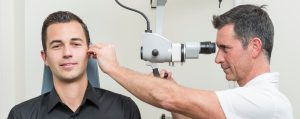HEARING AID PRACTITIONERS: UNDERSTANDING THEIR ROLE

01 December 2023
Many people confuse audioprosthetists, audiologists, and ear, nose, and throat (ENT) specialists. Although all of these professionals have the health of your ears and hearing at heart, they occupy very different roles and do not necessarily practice under the same roof. Audiologists and ENT specialists are often found in hospitals, while ENT specialists are often found in hospitals. Instead, the audioprosthetist takes care of his clients and patients in private clinics, such as the Masliah Centres.
To obtain quality hearing aids that are fully adapted to your needs and covered by the Régie d’assurance maladie du Québec (RAMQ) or by a private plan, you must first consult an audiologist or ENT specialist. In Quebec, however, only audioprosthetists are authorized to sell hearing aids, and that’s a good thing. This practice prevents audiologists and ENT specialists from prescribing hearing aids for profit.
What does a hearing care professional do?
If you’re wondering what a hearing healthcare professional does, know that he is the one who will guide you when you are ready to get hearing aids. Depending on the audiologist’s recommendations, he or she will ensure you have an informative meeting of approximately one hour:
to help you understand the results of the test performed by the audiologist;
to show you the devices that will be most effective in treating your problem;
to inform you about the available technologies and how the different styles of devices work;
to provide you with the prices of the different hearing aids;
to verify if you are eligible for coverage under a government program, such as the RAMQ, the Commission des normes, de l’équité, de la santé et de la sécurité du travail (CNESST), the Société de l’assurance automobile du Québec (SAAQ), Veterans Affairs and Aboriginal Affairs.
Once you have decided on a particular hearing aid, the audioprosthetist will take an impression of the inside of your ear. When the prosthesis is ready, he or she will make the necessary adjustments to ensure optimal functioning. Since your hearing condition changes over time and other adjustments may need to be made, your audioprosthetist will make regular appointments for you. During these appointments, he or she will also take the opportunity to maintain your hearing aids and, if necessary, make any necessary repairs.
Your hearing care professional will also show you:
how your devices work;
how to handle them;
how to maintain them;
how to use the desired additional accessories (such as TV accessories, your charger, magnetic loops or MF, and infrared systems).
The differences between the hearing healthcare professional and the audiologist
With a university master’s degree, the audiologist is the best person to assess hearing and vestibular disorders, such as dizziness and loss of balance.
If you suspect a problem, the audiologist is the first person you should see (before the ENT and hearing care professional). He or she will give you a complete hearing test in a soundproof booth.
Do you suffer from tinnitus (the buzzing, ringing, and hissing you hear in the absence of any external stimulus) or hyperacusis (excessive sensitivity of hearing)? The audiologist is also the first person you should see.
Briefly, what is a complete hearing test?
Determine hearing thresholds (when a sound becomes audible to you).
Assess your ability to understand one-syllable words in a quiet environment.
Assess the condition of your inner ear (especially the eardrum and bones, such as the stirrup).
Based on these results, the audiologist will be able to provide you with solutions, which may include hearing aids. In such a case, he or she will refer you to an audioprosthetist.
Learn more about the audiologist
Hearing aid practitioners and ENT doctors: different roles
The otolaryngologist is a doctor who specializes in the ear, nose, and throat. He treats various infections in these areas of the body, such as ear infections and sinusitis, as well as deafness, tinnitus, dizziness, and balance problems, through medication or surgery.
It is important to remember that some ear problems, including total or partial deafness, can have different causes. Depending on the cause of your hearing issue, you will need to see either the audiologist or the ENT doctor, or both.
Please note that more than 90% of hearing losses are sensorineural. They cannot be restored through surgery. In other words, the vast majority of people with hearing problems will need to purchase hearing aids to improve their hearing.
Learn more about the ENT doctor
How do I choose a hearing care professional?
Once your devices are ready and fitted to your hearing, your hearing care professional will give you follow-up appointments approximately every 6 months. It is therefore in your best interest to choose one near your home or work to make your life easier. Proximity, however, isn’t the only factor that should influence you when you are wondering how to choose your hearing healthcare professional. Here are a few things to think about.
What qualities should your hearing care professional have?
In order to provide exemplary service to the hearing impaired and to help them in the best possible way, a hearing care professional should:
Have a healthy hearing;
Empathize, listen, be patient with you, and show understanding for your disability or problems, including those of a psychological nature;
Use logic and judgment to find the best solution to your problem;
Be able to clearly explain your problem and the solutions available to you, so that you can make informed choices;
Be able to inform you about the functioning of your devices and their accessories;
Be handy and meticulous in order to properly handle, adjust, and fit your hearing aids;
Have a sense of aesthetics, in order to harmonize your prostheses with your style and make them as less visible as possible.
What studies has the hearing healthcare professional done?
The audioprosthetist holds a college diploma in audioprostheses, a three-year technical program that includes specialised courses in the field of human biology applied to the hearing system; electricity and magnetism in audioprostheses; audioprosthetist evaluation, fitting, and adaptation, etc. At the end of their DEC, students must complete lengthy work placements in the workplace, where they will have the opportunity to put into practice all the concepts acquired and develop their skills under the supervision of seasoned audioprosthetists.
To practise, an audioprosthetist must be a member of the Ordre des audioprothésistes du Québec. In fact, the audioprosthetist is a reserved title and is an exclusive profession (no one else is authorised to practise). To be a member of the Order, an audioprosthetist must renew his or her permit each year and comply with certain obligations, such as continuing education.
How can you get a refund for your hearing aids?
It is the duty of your hearing healthcare professional to inform you of all the hearing aid reimbursement options available to you. Hearing health is not a privilege reserved for the wealthy, which is why, if you are not fortunate enough to have a private insurance plan, the government will cover the cost of purchasing certain devices.
Here’s how to get hearing aids for your situation.
If you have private insurance
If you have group insurance or are a beneficiary (regardless of your age), you can go directly to the audiologist for a consultation in a private clinic. These services are generally covered by private plans. If the audiologist prescribes prostheses for you, they will also be reimbursed in part or in full by your insurance company, as will the services of the audioprosthetist.
Usually, you will get an appointment with an audiologist in a private clinic within a few days or weeks.
If you don’t have private insurance
If you wish to have your prostheses reimbursed in part or in full by the RAMQ, you must first make an appointment with your family doctor to obtain a prescription that will allow you to see an audiologist or ENT specialist. You will have to turn to an audiologist who works in a hospital setting so that the consultation fees are covered by health insurance.
In general, you will get an appointment between 4 to 12 months.
If you wish to speed things up, note that you will be able to consult an audiologist in a private clinic at your own expense, but still benefit from a reimbursement from the RAMQ for the purchase of your hearing aids from the audioprosthetist.
For more information on paying agencies, visit this information page on the reimbursements, and for any questions on this subject, do not hesitate to contact one of our 11 clinics covering the greater Montréal area, Lanaudière and the Laurentians (North Shore) as well as the Montérégie (South Shore).
Autres articles
THE MOST DISCREET HEARING AID: A TECHNOLOGICAL BREAKTHROUGH!
For the sake of objectivity and out of respect for the guidelines of the Ordre des Audioprothésistes du Québec, we…
HOW TO CLEAN YOUR EARS: GOOD HABITS TO ADOPT
Cleaning your ears regularly is obviously an important thing to do, since the ears are advanced, sensitive organs that are…
SYMPTOMS OF A RUPTURED EARDRUM AND MOVEMENTS TO ADOPT
A ruptured eardrum is very common and may occur for many reasons. How do you recognize it and what should…


